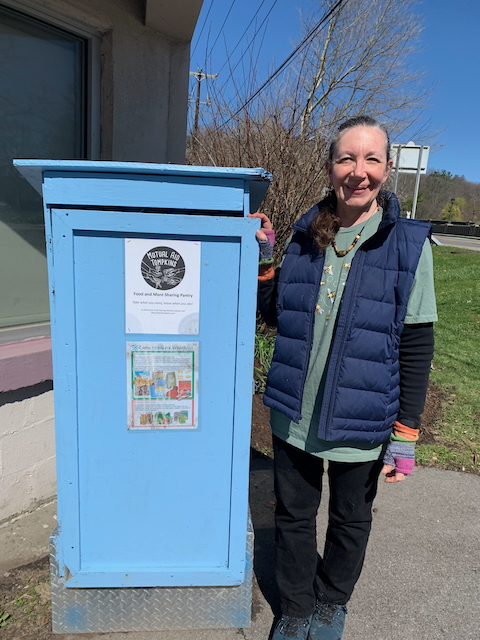Food Distribution Partner Spotlight: Theresa Fulton
Written by Kat Meadows, April 2025
Theresa Fulton is a deeply engaged community member who works to support people facing housing insecurity, food access challenges, and broader systemic neglect. Through both formal and informal efforts, she provides essential resources to individuals living in difficult conditions—including those in encampments and temporary shelters. Much of her work involves offering food, warm clothing, and critical supplies, and she often finds herself navigating a maze of local policies and regulations that complicate direct aid.
One ongoing concern is access to clean water: something as simple as installing a faucet from a city water line, she says, could vastly improve the living conditions for people in the Walmart encampment. Yet red tape—regulations about campground designations, technicalities about what qualifies as a “camp”—has delayed even these basic solutions.
Theresa is outspoken about the way rules and systems often inhibit creativity and compassion, especially when it comes to urban planning and aid distribution. She connects this with broader movements to rethink housing codes and make space for innovative solutions like tiny homes or backyard units. In her experience, common sense is often missing from policy conversations that urgently need it.
Food access is another central concern. Theresa reflects on the challenges of offering nutritious food to those who haven’t had consistent access to it. Many food pantries, she notes, rely heavily on starches and processed goods—items that provide calories but little else. She shares the tension she feels between respecting people’s preferences and wanting to gently shift them toward healthier options. For example, she’s frustrated when people consistently pass over Wide Awake Bakery bread in favor of highly processed white loaves, but also understands how deep food habits and comfort foods run—especially when someone’s life is already difficult.
She also appreciates the values that FDN represents. In her words, it’s remarkable that stores like Wegmans and Walmart make the effort to donate their surplus food when they could just throw it out the back door. To her, that generosity—combined with FDN’s structure—is proof that local systems can work when people care. “If there wasn’t an FDN,” she says, “they’d just be throwing all that stuff away.”
What Theresa values most is that FDN makes something possible that would otherwise be lost: turning food waste into sustenance, chaos into care. It’s a model she’s proud to be a part of, and one she hopes continues to grow as part of a more humane local safety net.
Theresa’s connection with Friendship Donations Network (FDN) is a lifeline in her work. From her perspective, FDN is more than just a food rescue operation—it’s a community backbone. She lights up when describing how volunteers at FDN pre-bag produce and other items, saving her precious time and allowing her to focus on distribution. It’s a relief, she says, to walk in and see that things are ready to go, packaged in manageable amounts for real people and real lives.

